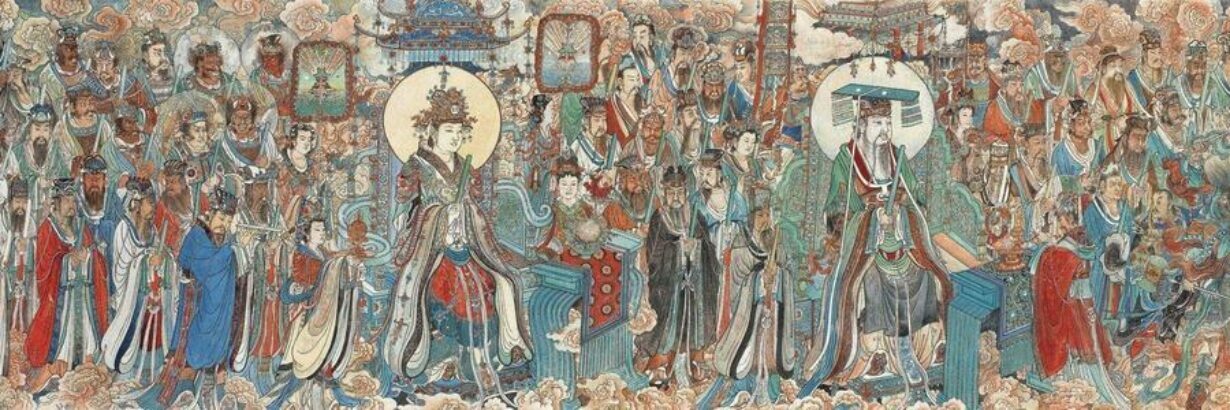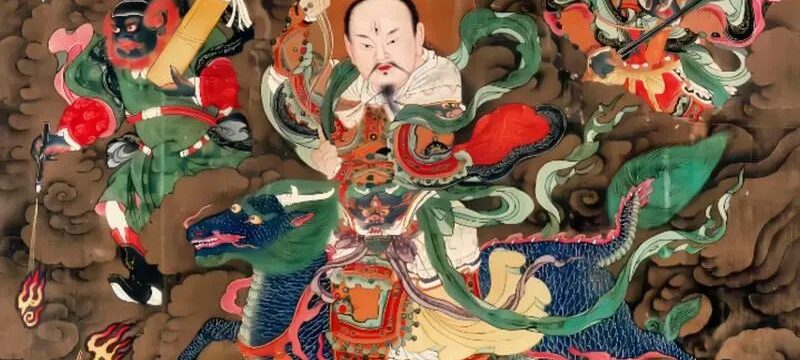九天应元雷声普化天尊 (Jiǔ Tiān Yìng Yuán Léishēng Pǔ Huà Tiānzūn), the Great Heavenly Lord of Universal Transformation, Resounding Thunder, and Response to the Origin in the Nine Heavens, is a deity revered in Chinese folk religion and Taoism. He is considered the incarnation of 南极长生大帝 (Nánjí Chángshēng Dàdì), the Great Emperor of Longevity of the Southern Pole. As the highest deity in the thunder department, he manages the complex organization of thunder gods.
The lunar June is the 雷斋月 (Léi Zhāi Yuè), the Month of Thunder Fasts in Taoism, spanning from the first to the twenty-fourth day. The twenty-fourth day of lunar June is the birthday of 雷祖 (Léi Zǔ), the Thunder Ancestor, “九天应元雷声普化天尊” (Jiǔ Tiān Yìng Yuán Léishēng Pǔ Huà Tiānzūn).
雷霆者,乃阴阳之枢机,号令万物之根本。故无有雷霆,则无以宰御三界。是以雷者,类也,是以出万类而起群品也。是元始生杀之机也。宇宙之始盖因阴阳相交一时之爆发,此即也是雷霆之用也,所以无处不有雷霆之显现。
Thunder (Léitíng) is the pivot of yin and yang, the fundamental command of all things. Without thunder, there would be no way to govern the three realms. Therefore, thunder categorizes all things and initiates all beings. It is the primordial mechanism of creation and destruction. The beginning of the universe stems from the explosive interaction of yin and yang, which is the function of thunder. Thus, thunder manifests everywhere.
九天应元雷声普化天尊主生杀枯荣、善恶赏罚、行云布雨、斩妖伏魔、号令雷霆。上照天心大道,下济幽冥群苦。《无上九霄玉清大梵紫微玄都雷霆玉经》载,浮黎元始天尊第九子南极长生大帝,化身雷声普化天尊,专制九霄三十六天,执掌雷霆之政。
Jiǔ Tiān Yìng Yuán Léishēng Pǔ Huà Tiānzūn governs life and death, prosperity and decline, rewards and punishments for good and evil, commands clouds and rain, vanquishes demons, and commands thunder. He illuminates the Great Way of Heavenly Heart above and alleviates the suffering of the underworld below. According to the 《无上九霄玉清大梵紫微玄都雷霆玉经》 (Wúshàng Jiǔxiāo Yùqīng Dàfàn Zǐwēi Xuándū Léitíng Yùjīng), he is the ninth son of 浮黎元始天尊 (Fúlí Yuánshǐ Tiānzūn), the Great Heavenly Lord of Primordial Beginning, incarnated as the Great Emperor of Longevity of the Southern Pole, governing the thirty-six heavens of the Nine Skies and administering the affairs of thunder.
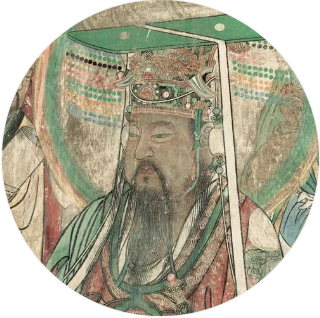
南极长生大帝 (Nánjí Chángshēng Dàdì) in the murals of 永乐宫 (Yǒnglè Gōng).
农历六月二十四,九天应元雷声普化天尊圣诞,敬请恭诵雷祖宝诰、雷祖圣号,可助力大众消灾解厄、福生无量!
On the twenty-fourth day of lunar June, the birthday of Jiǔ Tiān Yìng Yuán Léishēng Pǔ Huà Tiānzūn, we respectfully recite the 雷祖宝诰 (Léi Zǔ Bǎogào), the Thunder Ancestor’s Precious Invocation, and the holy names of 雷祖 (Léi Zǔ) to help the public dispel disasters and alleviate hardships, bringing infinite blessings!
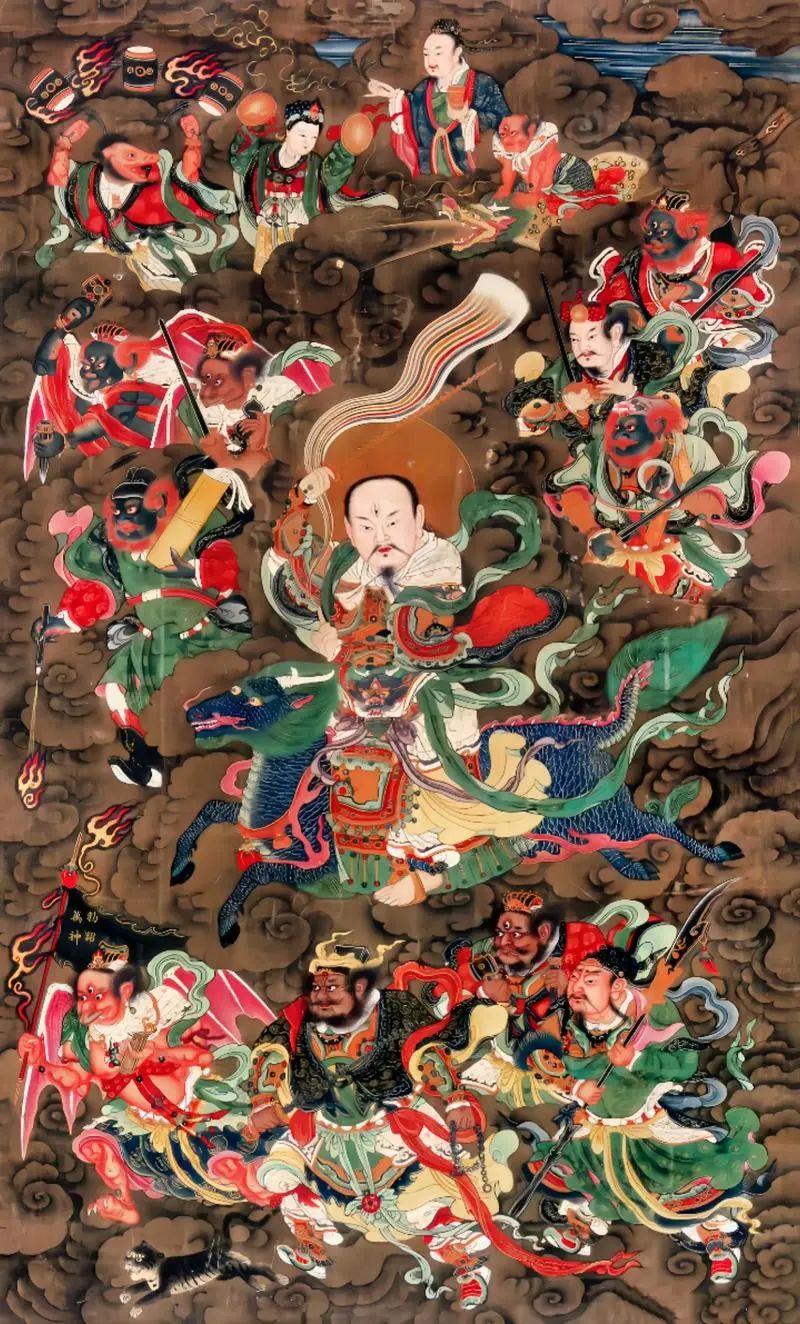
Declaration of the Thunder God 雷祖宝诰 (Léi Zǔ Bǎogào)
志心皈命礼。
With utmost sincerity, we bow and take refuge.
九天应元府,无上玉清王。
In the Nine Heavens’ Response Palace, the Supreme Jade Purity King.
化形而满十方,谈道而趺九凤。
Manifesting in all directions, discoursing on the Dao seated on nine phoenixes.
三十六天之上,阅宝笈考琼书
Above the thirty-six heavens, perusing precious scriptures and examining jade books.
千五百劫之先,位上真权大化。
Before one thousand five hundred kalpas, positioned as the supreme true authority of great transformation.
手举金光如意,宣说玉枢宝经。
Holding the golden light of the ruyi, proclaiming the Jade Pivot Precious Scripture.
不顺化作微尘,发号疾如风火。
Those who disobey transform into dust, issuing commands swift as wind and fire.
以清静心,而弘大愿。
With a tranquil heart, expanding great vows.
以智慧力,而伏诸魔。
With the power of wisdom, subduing all demons.
总司五雷,运心三界。
Mastering the Five Thunders, directing the three realms.
群生父,万灵师。
Father of all beings, teacher of ten thousand spirits.
大圣大慈,至皇至道。
Great Sage of great compassion, supreme sovereign of the supreme Dao.
九天应元雷声普化天尊。
Jiǔ Tiān Yìng Yuán Léishēng Pǔ Huà Tiānzūn.
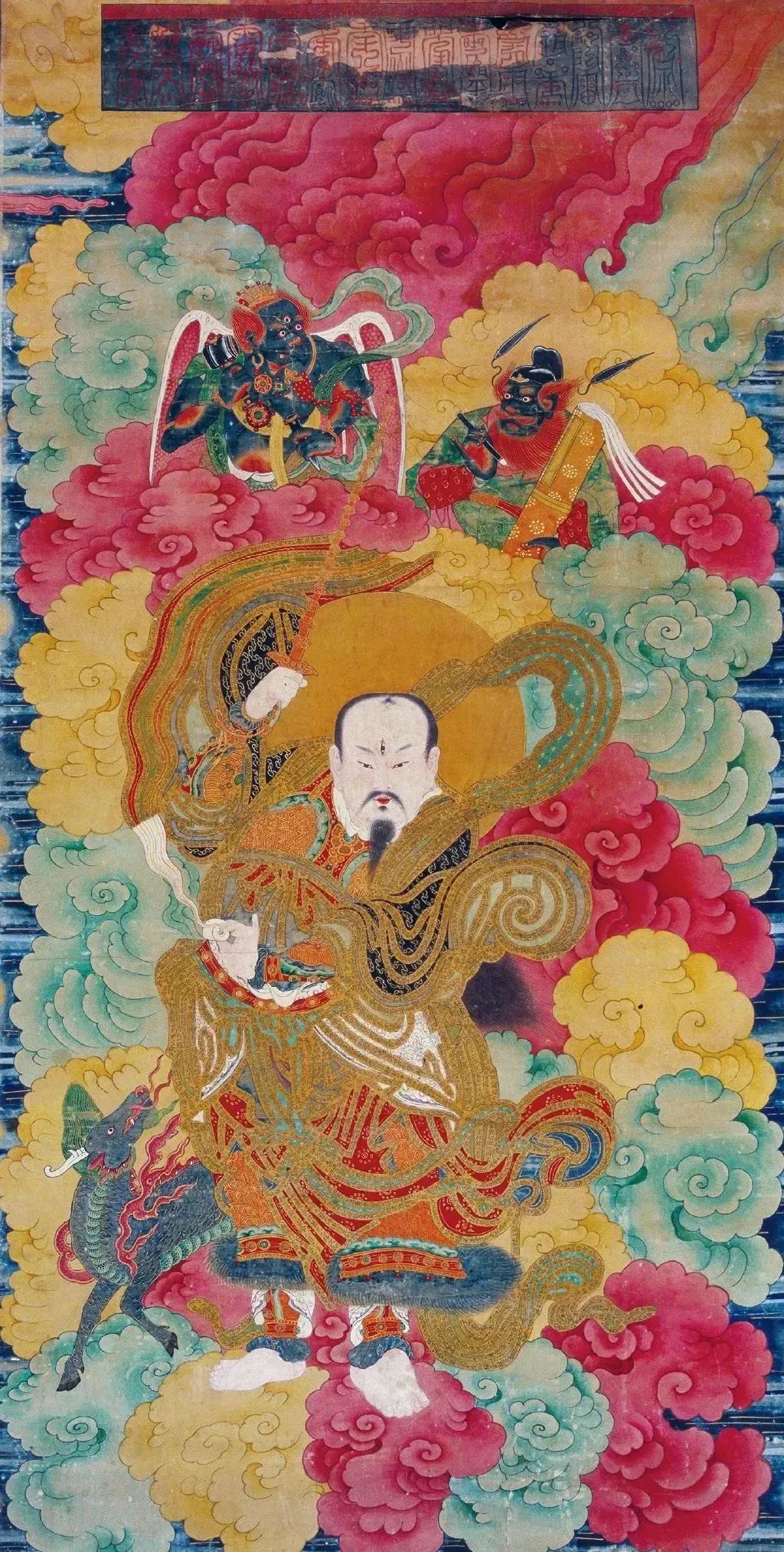
《九天应元雷声普化天尊玉枢宝经》 Jiǔ Tiān Yìng Yuán Léishēng Pǔ Huà Tiānzūn Yùshū Bǎojīng
The Jade Pivot Precious Scripture of Jiǔ Tiān Yìng Yuán Léishēng Pǔ Huà Tiānzūn, also known as the Thunder Jade Pivot Precious Scripture, was authored by an unknown person. It emerged around the late Northern Song or Southern Song dynasty. The scripture was spoken by Léishēng Pǔ Huà Tiānzūn, one of the nine stars of the heavenly court in the Divine Firmament Mansion, overseeing the Five Thunders, universal transformation, and reward and punishment of good and evil.
The scripture’s main content is divided into two sections. The first section discusses the Supreme Dao (Zhìdào), stating: “The Dao is entered through sincerity, maintained through silence, and utilized through softness. Sincerity appears foolish, silence appears slow, and softness appears clumsy. Thus, one can forget form, forget self, and forget forgetting. It also says, “Only by forgetting and not forgetting, forgetting what cannot be forgotten, can one attain the Supreme Dao.”
The second section discusses Qi and Fate (Qìshù), considering the different endowments of people as qi, and intelligence and dullness, purity and turbidity as fate; fate depends on destiny, qi on heaven. If a practitioner of the Dao is confined by qi and fate, and restricted by heavenly destiny, they cannot attain the true Dao. The scripture also describes methods to eliminate disasters and alleviate hardships, stating that in the event of the three disasters and nine calamities, one can recite the scripture according to the method. If one silently recites the name of Pu Hua Tian Zun, the various gods will dispel disasters and alleviate hardships; if one takes refuge in this scripture, one can achieve longevity.
雷部 (Léi Bù) – Thunder Department
The worship of 雷公 (Léi Gōng) and 雷神 (Léishén) has ancient origins. However, the establishment of the 雷部 (Léi Bù), the Thunder Department, with Jiǔ Tiān Yìng Yuán Léishēng Pǔ Huà Tiānzūn overseeing its affairs, is attributed to the late Northern Song dynasty. During the Northern Song period, Taoist schools like Shenxiao and Qingwei revered and practiced thunder rituals. Thus, the function of thunder extended beyond causing rain to include controlling heaven’s misfortunes and blessings, balancing objects, governing beings, and overseeing life and death.
The 《九天应元雷声普化天尊玉枢宝经》 states that those who are disloyal to the sovereign, unfilial to parents, or disrespectful to teachers and elders will be judged by the Five Thunder Executioners, first beheading their spirits and then examining their forms, causing their bodies to collapse.

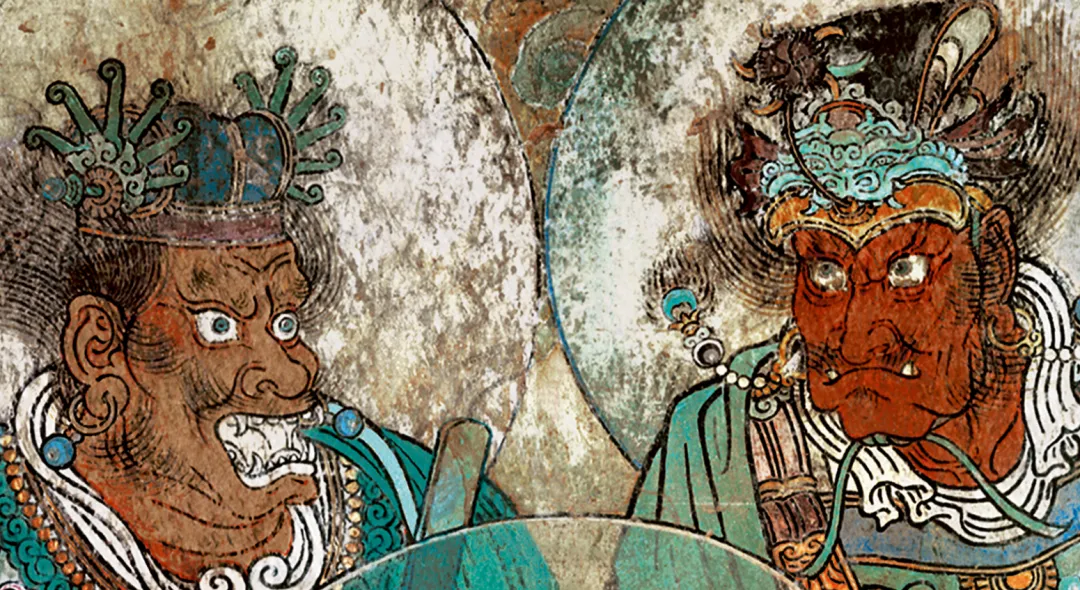
The highest Gods of Thunder
The Great Heavenly Lord of Universal Transformation, Resounding Thunder, and Response to the Origin in the Nine Heavens is described in the 《历代神仙通鉴》 (Lìdài Shénxiān Tōngjiàn) as “the master of heaven’s misfortunes and blessings, the holder of the balance of objects, the controller of beings and objects, and the overseer of life and death.” He commands a complex thunder department organization, headquartered in the Divine Thunder Jade Mansion, with subordinate institutions such as the Thirty-Six Inner Courts, Eastern and Western Flower Platforms, Mysterious Pavilion, Wonderful Halls, Four Mansions, Six Courts, and various departments.
According to the 《无上九霄玉清大梵紫微玄都雷霆玉经》, the Four Mansions are:
– 九霄玉清府 (Jiǔxiāo Yùqīng Fǔ)
– 东极青玄府 (Dōngjí Qīngxuán Fǔ)
– 九天应元府 (Jiǔ Tiān Yìng Yuán Fǔ)
– 洞渊玉府 (Dòngyuān Yù Fǔ)
The Six Courts are:
– 太一内院 (Tàiyī Nèiyuàn)
– 玉枢院 (Yùshū Yuàn)
– 五雷院 (Wǔ Léi Yuàn)
– 斗枢院 (Dǒu Shū Yuàn)
– 氏阳院 (Shì Yáng Yuàn)
– 仙都火雷院 (Xiāndū Huǒ Léi Yuàn)
The various departments include:
– 天部廷司 (Tiānbù Tíngsī)
– 蓬莱都水司 (Pénglái Dū Shuǐ Sī)
– 太乙雷霆四司 (Tàiyǐ Léitíng Sì Sī)
– 北帝雷霆司 (Běidì Léitíng Sī)
– 北斗征伐司 (Běidǒu Zhēngfá Sī)
– 北斗防卫司 (Běidǒu Fángwèi Sī)
– 玉府雷霆九司 (Yùfǔ Léitíng Jiǔ Sī)
– 及诸曹院子司 (Jí Zhū Cáoyuàn Zǐ Sī)
Each institution includes various roles like 玉府左玄 (Yùfǔ Zuǒxuán), 右玄 (Yòuxuán), 金阀侍中 (Jīnfá Shìzhōng), 仆射 (Púyè), 上相真仙 (Shàngxiàng Zhēnxiān), 真伯 (Zhēnbó), 卿监 (Qīngjiàn), 恃宸 (Shìchén), 仙郎 (Xiānláng), 玉郎 (Yùláng), 玉童 (Yùtóng), 玉女 (Yùnǚ), with various thunder gods, officials, and soldiers.
The Thunder Department includes:
– 九天雷公将军 (Jiǔ Tiān Léi Gōng Jiāngjūn)
– 八方云雷将军 (Bā Fāng Yún Léi Jiāngjūn)
– 五方蛮雷使者 (Wǔ Fāng Mán Léi Shǐzhě)
– 雷部总兵使者 (Léi Bù Zǒngbīng Shǐzhě), all under the command of Jiǔ Tiān Yìng Yuán Léishēng Pǔ Huà Tiānzūn.
The scripture states there are thirty-six thunder gods, divided into three categories: heaven, earth, and human, each with twelve members.
三十六雷公 (Sānshíliù Léigōng) – Thirtysix Thunder Generals
Twelve Heavenly Thunders (天雷十二):
– 神霄雷公 (Shénxiāo Léigōng)
– 五方雷公 (Wǔ Fāng Léigōng)
– 行风雷公 (Xíng Fēng Léigōng)
– 行雨雷公 (Xíng Yǔ Léigōng)
– 行云雷公 (Xíng Yún Léigōng)
– 布泽雷公 (Bù Zé Léigōng)
– 行冰雷公 (Xíng Bīng Léigōng)
– 行霄雷公 (Xíng Xiāo Léigōng)
– 飞砂雷公 (Fēi Shā Léigōng)
– 食粜雷公 (Shí Tiào Léigōng)
– 伏魔雷公 (Fú Mó Léigōng)
– 吞鬼雷公 (Tūn Guǐ Léigōng)
Twelve Earthly Thunders (地雷十二):
– 纠善雷公 (Jiū Shàn Léigōng)
– 罚恶雷公 (Fá È Léigōng)
– 社令雷公 (Shè Lìng Léigōng)
– 发稻雷公 (Fā Dào Léigōng)
– 四序雷公 (Sì Xù Léigōng)
– 却灾雷公 (Què Zāi Léigōng)
– 收毒雷公 (Shōu Dú Léigōng)
– 扶危雷公 (Fú Wēi Léigōng)
– 救病雷公 (Jiù Bìng Léigōng)
– 太升雷公 (Tài Shēng Léigōng)
– 巡天雷公 (Xún Tiān Léigōng)
– 察地雷公 (Chá Dì Léigōng)
Twelve Human Thunders (人雷十二):
– 收瘟雷公 (Shōu Wēn Léigōng)
– 摄毒雷公 (Shè Dú Léigōng)
– 却祸雷公 (Què Huò Léigōng)
– 除祸雷公 (Chú Huò Léigōng)
– 破祸雷公 (Pò Huò Léigōng)
– 破庙雷公 (Pò Miào Léigōng)
– 封山雷公 (Fēng Shān Léigōng)
– 伏虎雷公 (Fú Hǔ Léigōng)
– 打虎雷公 (Dǎ Hǔ Léigōng)
– 灭尸雷公 (Miè Shī Léigōng)
– 破障雷公 (Pò Zhàng Léigōng)
– 管魄雷公 (Guǎn Pò Léigōng)
– 荡怪雷公 (Dàng Guài Léigōng)
These thirty-six thunder gods govern the laws of the thirty-six heavens, strictly following the orders of Jiǔ Tiān Yìng Yuán Léishēng Pǔ Huà Tiānzūn. The scripture states, “The orders of the Thunder Division are executed as swiftly as wind and fire, without delay. When mercy is bestowed, it is abundant; when thunder strikes, it is precise. Drought can occur if commanded, and rain can fall if ordered, all in accordance with the imperial decree.”
The scripture also states that Jiǔ Tiān Yìng Yuán Léishēng Pǔ Huà Tiānzūn governs five thunders, ten thunders, and thirty-six thunders.
Five Thunders:
– 天雷 (Tiān Léi)
– 地雷 (Dì Léi)
– 水雷 (Shuǐ Léi)
– 神雷 (Shén Léi)
– 社雷 (Shè Léi)
Ten Thunders:
– 玉枢雷 (Yùshū Léi)
– 神霄雷 (Shénxiāo Léi)
– 大洞雷 (Dàdòng Léi)
– 仙都雷 (Xiāndū Léi)
– 北极雷 (Běijí Léi)
– 太乙雷 (Tàiyǐ Léi)
– 紫府雷 (Zǐfǔ Léi)
– 玉晨雷 (Yùchén Léi)
– 太霄雷 (Tàixiāo Léi)
– 太极雷 (Tàijí Léi)
Thirty-Six Thunders:
– 玉枢雷 (Yùshū Léi)
– 玉府雷 (Yùfǔ Léi)
– 玉柱雷上清大洞雷 (Yùzhù Léishàng Qīng Dàdòng Léi)
– 火轮雷 (Huǒlún Léi)
– 灌斗雷 (Guàndǒu Léi)
– 风火雷 (Fēnghuǒ Léi)
– 飞捷雷 (Fēijié Léi)
– 北极雷 (Běijí Léi)
– 紫微璇枢雷 (Zǐwēi Xuánshū Léi)
– 神霄雷 (Shénxiāo Léi)
– 仙都雷 (Xiāndū Léi)
– 太乙轰天雷 (Tàiyǐ Hōngtiān Léi)
– 紫府雷 (Zǐfǔ Léi)
– 铁甲雷 (Tiějiǎ Léi)
– 邵阳雷 (Shàoyáng Léi)
– 欻火雷 (Chuīhuǒ Léi)
– 社令蛮雷 (Shèlìng Mán Léi)
– 地祗鸣雷 (Dìzhī Míng Léi)
– 三界雷 (Sānjiè Léi)
– 斩圹雷 (Zhǎnkuàng Léi)
– 大威雷 (Dàwēi Léi)
– 六波雷 (Liùbō Léi)
– 青草雷 (Qīngcǎo Léi)
– 八卦雷 (Bāguà Léi)
– 混元鹰犬雷 (Hùnyuán Yīngquǎn Léi)
– 啸命风雷 (Xiàomìng Fēngléi)
– 火云雷 (Huǒyún Léi)
– 禹步大统摄雷 (Yǔbù Dàtǒngshè Léi)
– 太极雷 (Tàijí Léi)
– 剑火雷 (Jiànhuǒ Léi)
– 外鉴雷 (Wàijiàn Léi)
– 内鉴雷 (Nèijiàn Léi)
– 神府天枢雷 (Shénfǔ Tiānshū Léi)
– 大梵斗枢雷 (Dàfàn Dǒushū Léi)
– 玉晨雷 (Yùchén Léi)
The worship of thunder gods as a traditional nature deity has a deep foundation of faith. Daoist thunder god worship is supported by rich Daoist texts and forms a comprehensive thunder deity system. This not only enhances the recognition of Daoist thunder god worship but also promotes its spread. As a multidimensional object of worship, Daoist thunder god belief inevitably intertwines with Daoist rituals, particularly rain-seeking and drought-ending ceremonies, becoming a lively religious practice with a profound philosophical expression.
Whether through Daoist emphasis on thunder god worship or the naming of the “Leishenshan” hospital during the pandemic, the belief in thunder gods serves as a cultural and spiritual symbol, embodying people’s aspirations for a life of favorable weather and disaster-free living, reflecting the deep cultural roots of Daoist deity worship.
Written and Translated by Daoist Liu Cheng Yong, German Daoist Association.
